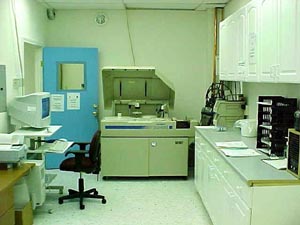courtesy NORML News
The White House Office of National Drug Control Policy (ONDCP) will once again sponsor a series of regional summits to encourage middle-school and high-school administrators to enact federally sponsored random student drug testing. The 2007 summits will mark the fourth consecutive year that the White House is funding the symposiums, which are scheduled to take place this winter and spring in Charleston, South Carolina (January 24), Newark, New Jersey (February 27), Honolulu, Hawaii (March 27), and Las Vegas, Nevada (April 24).

Since 2005, the Education Department has appropriated more than $20 million to various school districts to pay for random drug testing programs. Federal grant funds may not be used to pay for separate drug education and/or prevention curricula, nor may any funds be used to train school staff officials on how to implement drug testing. Only federal investigators are eligible to review data collected by the school programs, which will be evaluated as part of a forthcoming federal assessment of the efficacy of random drug testing to deter illicit student drug use.
A previous evaluation of student drug testing programs conducted by the Robert Wood Johnson Foundation concluded, "Drug testing, as practiced in recent years in American secondary schools, does not prevent or inhibit student drug use." Investigators collected data from 894 schools and 94,000 students and found that at every grade level studied -- 8, 10, and 12 -- students reported using illicit drugs at virtually identical rates in schools that drug tested versus those that did not.
Currently, only five percent of schools randomly drug test student athletes, and some two percent of schools test students who participate in extra-curricular activities other than athletics. Both the National Education Association and the American Academy of Pediatrics oppose such student testing programs.
Visit http://www.cmpinc.net/dts/ to register online to attend any of this year's summits. Visit http://www.norml.org/index.cfm?Group_ID=3406 to download NORML fact-sheets on random student drug testing.
This work by StoptheDrugWar.org is licensed under Creative Commons Attribution-ShareAlike 4.0 International
Comments
Counter-Productive
What a wonderful idea, implement a program whose only true effect will be to turn at risk kids AWAY from competitive sports and other extra curricular activities that will help them to become better adjusted adults. Say you're a kid who doesn't have a great home life, has a C average, smokes pot, and likes to play football and is really quite good at it. Well, as soon as that drug testing plan goes into effect he'll probably quit the football team, the one good thing in his life, hell something he could have gone to college with, because of this repressive drug testing plan.
Drug Testing In Schools
I think that random drug testing should be put into effect in all schools. It is a very good idea. This could possibly help to keep students off of drugs.
I agree, there are many
I agree, there are many students who have a perfectly fine home life and just use drugs for their assument. Drugs are illeagal. You get put on a sports team and get playing time by how good you are. But it's not fair for those who are really good to be able to break the laws and rules and be able to use drugs. This will put a limit on how to stop more kids from using drugs. It may drive some people away from doing drugs but it may help them stop to. If their smoking pot in high school and young kids, chances are they'll still be doing it in college and later on in life. There are ways kids can get around drug-testing, and their are ways we can make it better so they don't. I've been on a varsity soprts team from Freshmen and up, now I'm a sopmore in college still in sports. And it just ticks me off when I see other athletes using drugs.
I am doing a project on drug testing
If you have any stories about your child or if you know of a story then please post the story on here. I would greatly appreciate it!
I NEED STATISTICS
I need to know how many people oppose school drug testing and how many are for school drug testing if someone knows where i could find that please tell me and if you know please tell me!!
Oral Fluid Drug Testing is the way to go!!!
I've heard all of the arguments and have read and seen all of the programs. The urine based testing program are the easiest to beat and most programs have a zero percent positive rate after the first month because the kids just look up on the internet for a way to dilute their specimen. The only truly cost effective and time efficient way of doing student random testing is through the use of the Intercept laboratory based oral fluid drug testing program coupled with the Q.E.D. saliva alcohol screen.
Also, for those who believe that you are going to "push away" good athletes who have a C average, a bad home life etc. are not seeing the point of the deterrent effect. Students are going to use drugs anyway. They always have and always will. Give them a good reason to say no. "I can't do this because I'll get kicked off of the team!" You are still going to have kids that are going to use. Just look at Ricky Williams as an example. It promotes a safer environment, builds character, and ultimately saves lives.
Does anyone know how to write a grant request?
Drugs not hugs
Drugs not hugs
Add new comment